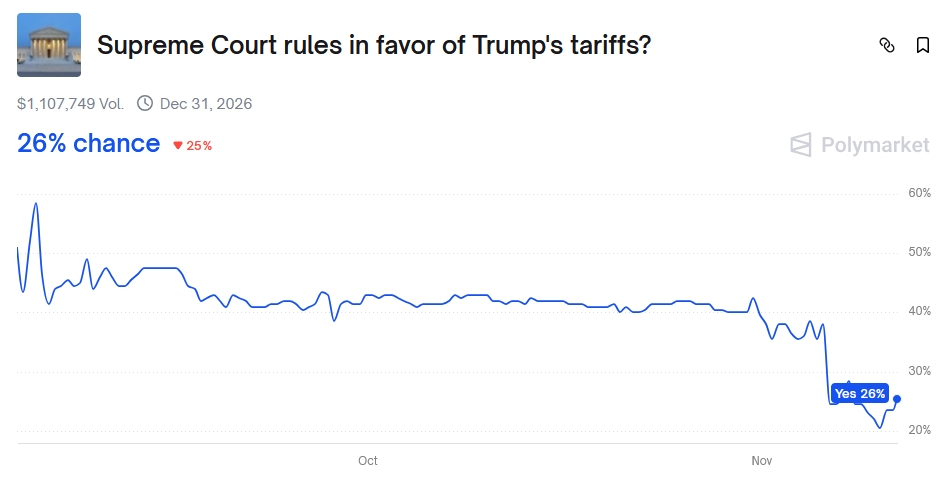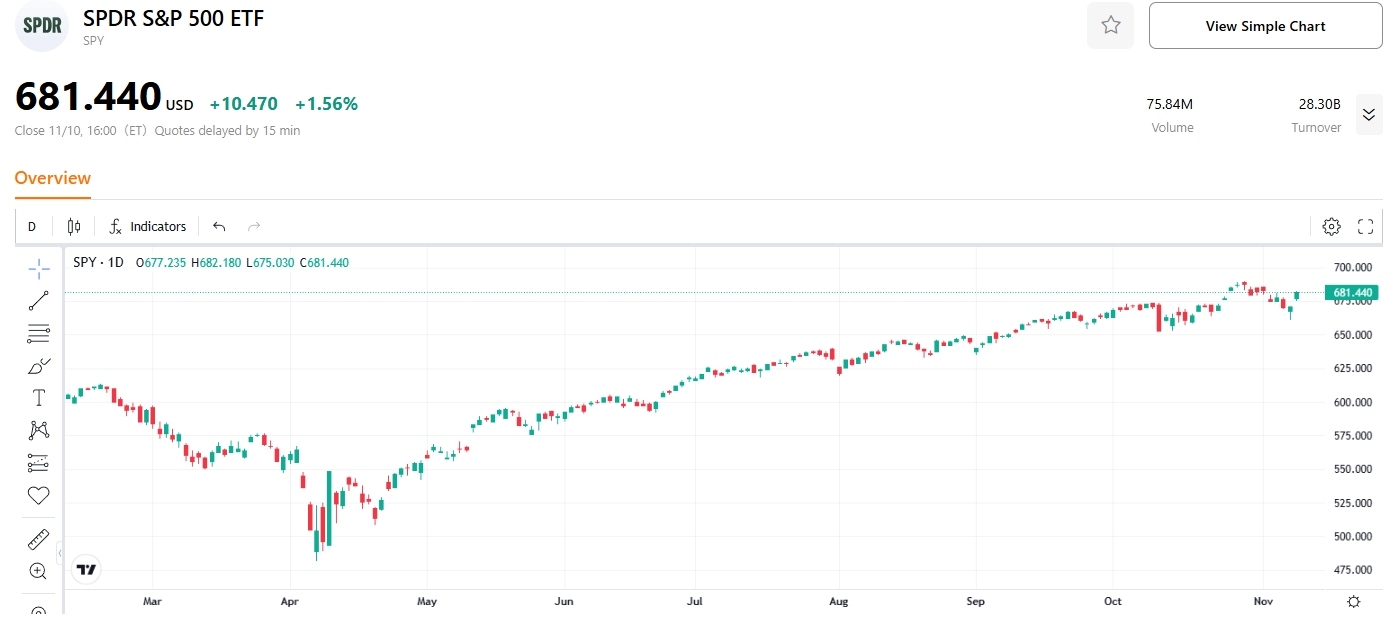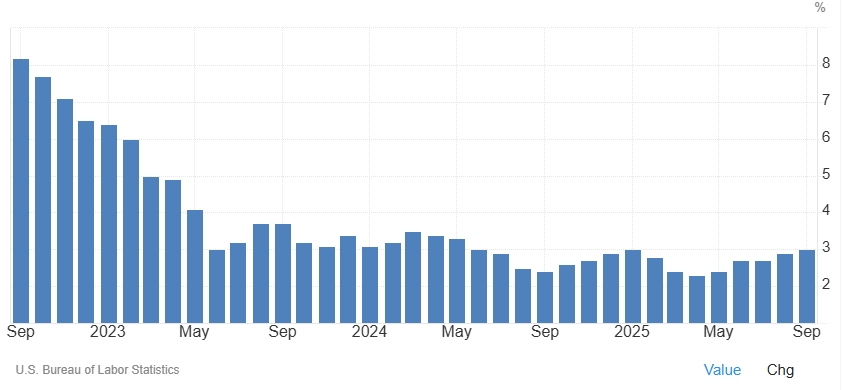The "Tariff Refund Trade" Tested: Could Trump's Defeat Spark U.S. Stocks Rally, Despite Analyst Unease?
TradingKey - The U.S. Supreme Court heard arguments on November 5 regarding the legality of President Donald Trump’s tariffs, with a majority of justices questioning the president's taxing authority, leading traders to price in less than a 30% chance of a Trump administration victory. Should Trump's signature economic policy face defeat, would the resulting "tariff refund trade" be a boon or a bane for U.S. equities?
Among the nine Supreme Court justices—six conservatives and three liberals—three conservative and three liberal justices raised concerns about Trump's tariff policy. The Associated Press noted that if they ultimately vote against Trump's tariff policy, the Supreme Court could curb the president's power to impose tariffs, although it is unlikely to entirely dismantle a policy that has been in effect for months.
As of November 11, data from prediction market Polymarket indicated that investor bets on whether the Supreme Court will uphold Trump's tariffs initially plummeted from 40% in late October to 22%, before modestly recovering to 26%.

【Probability of Trump's Tariffs Being Upheld, Source: Polymarket】
The Yale Budget Lab noted that following a series of tariff agreements with various trading partners, the average effective U.S. tariff rate currently stands at 17.9%, marking its highest level since 1934.
While the Supreme Court is theoretically required to issue a final ruling on the legality of the tariffs by July of next year, legal experts anticipate an earlier decision, potentially by year-end, given the significant real-world implications.
TradingKey previously analyzed that a defeat for Trump's tariffs could trigger several consequences, including tariff revenue refunds and fiscal pressure, renegotiation of trade agreements, a reversal of impacts on the domestic economy and consumers, mid-term election pressure, and long-term challenges to presidential power.
For capital markets, especially U.S. equity investors, would a ruling that "Trump's tariffs are illegal" truly herald another market rally?
Exiting Tariff Shocks
The reciprocal tariffs announced by the Trump administration in early April initially caused the S&P 500 Index to suffer its largest five-year decline and pushed the Nasdaq Composite into a technical bear market. JPMorgan Chase warned that a full-blown trade war would exacerbate inflationary pressures and drag down economic growth, projecting the probability of a global economic recession in 2025 to climb to 60%.
Tariff uncertainty has consistently been a core trading theme for U.S. equity investors this year, spawning new investment narratives such as the "TACO Trade" and "Sell America." The upward movement in stock indices following the Supreme Court's questioning of Trump's tariff legality suggests that capital markets are already preparing to celebrate a potential Trump defeat.
From a corporate perspective, if the Trump administration is compelled to refund nearly $100 billion in collected tariff revenue, this would undoubtedly be a windfall for companies that paid these duties, improving their financial liquidity and earnings outlook.
Bustamante Capital Management stated that the removal of tariffs would be a positive factor for the market. In fact, the market has already begun to price this in, anticipating improved capital flows in certain sectors.
Glenmede believes that the practical effect of substantial tariff refunds to corporations would be equivalent to an additional layer of corporate stimulus, compounding the tailwinds from the "Big and Beautiful Act" and sustained monetary easing by the Federal Reserve.
Furthermore, a decline in the average effective U.S. tariff rate would weaken the momentum for a persistent inflation rebound, potentially providing the Federal Reserve with greater room for interest rate cuts and thus boosting stock prices.
Citi, observing market movements on the day of the hearing, initially inferred a future scenario of "IEEPA tariffs being overturned." This included a more than 5 basis point drop in 1-year inflation swap yields, indicating investors were pricing in expectations of reduced inflationary pressure; concurrently, the small-cap Russell 2000 Index outperformed the S&P 500, suggesting that industries more sensitive to tariffs would be bigger winners.
Tariff Retreat, Fiscal Strain
According to Yale Budget Lab, Trump's original tariff policy could generate $2.2 trillion in revenue over the next decade. If the Supreme Court rules unfavorably against the Trump administration (most likely by canceling some tariffs while retaining others), this figure could be halved.
Trump pointed out that the IEEPA tariffs the U.S. government might need to refund far exceed the justices' estimated minimum of $100 billion (potentially over $2 trillion in tariff revenue and investments). He added that if they lose in the Supreme Court, it would be a national security disaster.
Research indicates that tariff revenue, which has grown 150% year-over-year to date, has been a crucial factor in reducing the overall deficit by approximately 2%. Against a backdrop of already elevated government fiscal deficits, losing this "blood transfusion" of additional tariff revenue would pose an even more severe challenge to U.S. fiscal health.
Compared to the equity market, the U.S. bond market may be more sensitive to this factor. Standard Chartered Bank anticipates that if Trump's tariffs are deemed illegal, U.S. Treasury yields are expected to rise, while the dollar would experience a significant decline.
ING stated that bond market investors are already questioning the growing trajectory of U.S. debt. To avoid further increasing public debt, Trump would have to reduce his tax cuts or find other ways to offset the budget deficit.
Capital Economics also noted that an unfavorable ruling for Trump would limit the scale of any fiscal stimulus, even if the government is unlikely to fully offset the revenue loss. This implies that uncertainty around interest rates will resurface, and the combination of these two factors could constrain any boost to equities.
A surge in long-term interest rates would theoretically deter investors from increasing their exposure to U.S. equities. Crit Thomas, a strategist at Touchstone Investments, finds the current calm in the stock market surprising given the risk that tariff policies might be overturned.
He anticipates that the Supreme Court's inclination to reject tariff policies could lead to a market pullback, perhaps a significant one.
Tariffs and U.S. Equities: Coexisting in a "Comfort Zone"
Despite the U.S. average tariff rate reaching a near-century high, U.S. equities have continued to hit historical records since early 2025 under this risk environment. Surprisingly, tariffs have not led to a significant rebound in inflation nor sustained stock market downturns.

【S&P 500 ETF - SPDR, Source: TradingKey】
Crossbridge Capital pointed out that while the tariffs announced in April initially unsettled investors, subsequent reductions and negotiations have allowed the market to gradually adapt. If the Supreme Court were to reverse this policy at this juncture, it could introduce further uncertainty for business activities and markets.
The Trump team has repeatedly defended the inflation pass-through effect of its tariff policies, noting that food and energy prices are falling and projecting inflation to soon decline to 1.5%.

【U.S. CPI Year-on-Year, Source: Trading Economics】
Crossbridge added that the fact that tariffs have generated revenue for the U.S. government without triggering a significant acceleration in inflation has helped investors grow comfortable with them.



